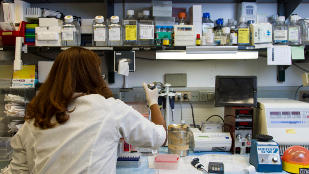 IMAGE, NCI - DANIEL SONECommencing a study that will enroll 1,000 cancer patients with specific tumor mutations, researchers at the National Cancer Institute (NCI) will be matching participants to more than 20 different drugs, each designed to target specific genetic changes. The NCI team announced the launch of its Molecular Analysis for Therapy Choice (NCI-MATCH) trial yesterday (June 1) at the annual American Society of Clinical Oncology (ASCO) meeting in Chicago. “This is the largest and most rigorous precision oncology trial that has ever been attempted,” James Doroshow, deputy director of the NCI, said at the ASCO meeting.
IMAGE, NCI - DANIEL SONECommencing a study that will enroll 1,000 cancer patients with specific tumor mutations, researchers at the National Cancer Institute (NCI) will be matching participants to more than 20 different drugs, each designed to target specific genetic changes. The NCI team announced the launch of its Molecular Analysis for Therapy Choice (NCI-MATCH) trial yesterday (June 1) at the annual American Society of Clinical Oncology (ASCO) meeting in Chicago. “This is the largest and most rigorous precision oncology trial that has ever been attempted,” James Doroshow, deputy director of the NCI, said at the ASCO meeting.
Precision medicine, sometimes referred to as personalized medicine, is an increasingly prevalent approach, championed by President Barack Obama in his 2015 State of the Union address. Researchers will begin screening and enrolling patients in the Phase 2 NCI-MATCH trial at 2,400 US clinical sites next month. Doroshow said at the briefing announcing the launch of the study that he expects it to cost $30 million to $40 million, though the price tag may change as the trial progresses.
Cancer researchers are hopeful that the NCI-MATCH trial and ASCO’s Targeted Agent and Profiling Utilization Registry (TAPUR) study, which was also announced Monday, will advance precision medicine and increase scientists’ understanding of basic cancer biology. “That’s the promise of precision medicine,” José Baselga of New York City’s ...



















